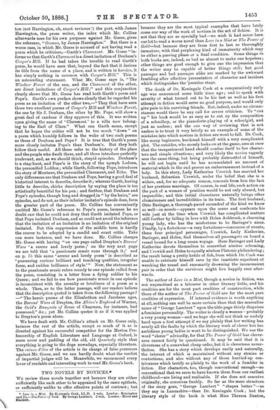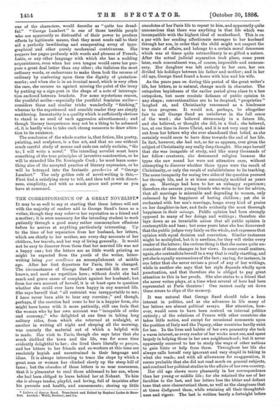TWO NOVELS BY NOVICES.* WE review these novels together not
because they are either sufficiently like each other to be appraised. by the same epithets, or sufficiently unlike to offer effective points of contrast ; but
* Lore in a Mist. By Kcninga/e Cook, LL.D. 2 vols. London : Remington and Co.— no Paver if Gold. By George Lambert. 2 vols. London : Hurst and Blackett, because they are the most typical examples that have lately come our way of the work of novices in the art of fiction. It is not that they are so specially bad—we wish it had never been our lot to read a worse novel than Love in a Mist or The Power of Gold—but because they are from first to last so thoroughly immature, with that perplexing kind of immaturity which may be either a passing phase er a final condition. Some things in both books are, indeed, so bad as almost to make one hopeless ; other things are good enough to give one the impression that the writer may be capable of better things still ; but good passages and bad passages alike are marked by the awkward fumbling after effective presentation of character and incident which distinguishes the 'prentice stage.
The death of Dr. Keningale Cook at a comparatively early age was announced some little time ago ; and to speak with severity of what turned out to be his last as well as his first attempt in fiction would serve no good purpose, and would only give pain to his surviving friends. But, indeed, under no circum- stances would there be any call for severe criticism. To "cut up" his book would be as easy as to cut up the composition of a schoolboy, or the pianoforte-playing of a schoolgirl, and just as useless ; and the one way of reviewing that is not useless is to treat it very briefly as an example of some of the mistakes into which novices in fiction are wont to fall. Dr. Cook, like many beginners, burdened himself with a very complicated plot. The outsider, who merely looks on at the game, sees at once that the inexperienced hand should confine itself to few charac- ters and simple situations; and very likely the novice vaguely sees the same thing, but being probably distrustful of himself, he will not begin until he has accumulated an amount of material which in the end proves an embarrassment instead of a help. In this story, Lady Katherine Urswick has married her husband, Sebastian Urswick, under the belief that she is a widow, and, for no adequate reason, conceals from him the fact of her previous marriage. Of course, in real life, such action on the part of a woman of position would be not only absurd, but impossible; and this initial clumsiness naturally brings other clumsinesses and incredibilities in its train. The first husband, Otto Baringer, a thorough-paced scoundrel of the kind we know so well—in novels—appears upon the scene and confronts his wife just at the time when Urswick has complicated matters still further by falling in love with Helen Ashbrook, a charming young lady, who has the misfortune to be Baringer's niece. Finally, by a fortuitous—a very fortuitous—concourse of events, these four principal personages, Urswick, Lady Katherine, Baringer, and Helen, find themselves all passengers on board a vessel bound for a long ocean voyage. Here Baringer and Lady Katherine devote themselves to somewhat aimless scheming, and Urs wick and Helen to equally aimless Platonic philandering ;
the result being a pretty kettle of fish, from which Dr. Cook was unable to extricate himself save by the inartistic expedient of wrecking the vessel and summarily drowning the inconvenient pair in order that the survivors might live happily ever after- wards.
The author of Love in a Mist, though a novice in fiction, was not unpractised as a labourer in other literary fields, and his
crudities are for the most part crudities of construction, while
those of the author of The Power of Gold are for the most part crudities of expression. If internal evidence is worth anything
at all, nothing can well be more certain than that the masculine name of "George Lambert" upon the title-page thinly disguises a feminine personality. The writer is clearly a woman—probably a very young woman—and we hope she will not think us unduly hard upon a first attempt if we say plainly that her writing has nearly all the faults by which the literary work of clever but too ambitions young ladies is wont to be distinguished. We use the
word "clever" advisedly, for that The Power of Gold has clever- ness cannot fairly be questioned. It may be said that it is
cleverness of a somewhat cheap order, but it is cleverness never-
theless. She has a story which develops easily and naturally, the interest of which is maintained without any strains or
contortions, and also without any of those hurried-up con- trivances which testify so plainly to the work of a fumbler in fiction. Her characters, too, though conventional enough—so conventional that we seem to have known them from our earliest childhood—are living and realisable. If she does not conceive originally, she conceives freshly. So far as the mere structure
of the story goes, "George Lambert" "shapes better "—as they say in Lancashire—than Dr. Keningale Cook ; but the literary style of the book is what Miss Theresa Denton,
one of the characters, would describe as "quite too dread- ful." "George Lambert" is one of those terrible people who are apparently so distrustful of their power to produce effects by legitimate means, that they must needs call to their aid a perfectly bewildering and exasperating array of typo- graphical and other purely mechanical contrivances. She peppers her pages profusely with words and phrases of French, Latin, or any other language with which she has a nodding acquaintance, even when her own tongue would serve her pur- pose a great deal better than any other ; she italicises the most ordinary words, or endeavours to make them look the reverse of ordinary by conferring upon them the dignity of quotation- marks ; and when she is in an ironical mood, which is very often the case, she secures us against missing the point of the irony by putting up a sign-post in the shape of a note of interroga- tion enclosed between brackets. For some mysterious reason, the youthful scribe—especially the youthful feminine scribe— considers these and similar tricks wonderfully "fetching," whereas to the experienced and sensible reader they are simply maddening. Immaturity is a quality which is sufficiently obvious to stand in no need of such aggressive advertisement ; and though literary inexperience may not be a thing to be ashamed of, it is hardly wise to take such strong measures to draw atten- tion to its existence.
The conclusion of the whole matter is, that fiction, like poetry, painting, and sculpture, is a fine art, and that no one without much careful study of means and ends can safely exclaim, "Go to ; I will write a novel." The intending novelist must learn something of the true principles of inventive construction, or he will be stranded like Dr. Keningale Cook ; he must learn some- thing also of the accepted practice of literary expression, or he will be betrayed into the fantastic gaucheries of "George Lambert." The only golden rule of novel-writing is this,— First find a satisfying story to tell, and then tell it with direct- ness, simplicity, and with as much grace and power as you have at command.





































 Previous page
Previous page